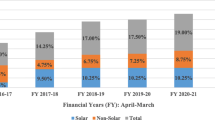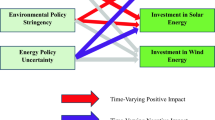Abstract
Financial globalization has been argued to contribute to the increase/decrease in greenhouse gases and hence global temperature. India, according to International Energy Agency (IEA), is the third largest emitter of greenhouse gases globally, where the consumption of the few rich produces about seven times carbon emissions when compared with the poorest households. This current research explores the asymmetric effect of financial globalization on carbon emissions, while controlling for non-renewable energy utilization, renewable energy consumption, and economic expansion. The study uses yearly data stretching from 1970 to 2018 and batteries of econometric approaches in order to investigate these associations. The outcomes of the NARDL unveiled that (i) a positive (negative) shock in non-renewable energy utilization increases (decrease) carbon emissions; (ii) favorable (unfavorable) variations in renewable energy consumption decrease carbon emissions; (iii) a favorable shock in financial development contributes to carbon emissions; and (iv) a positive shock in growth impacts carbon emissions positively. Based on the empirical outcomes, we are of the opinion that policymakers should intensify efforts in putting in place appropriate environmental policy (green economy) that emphasizes the importance of renewable driven economy via energy-saving and energy-efficient technologies. Else, increased consumption on non-renewable energy sources among the few rich in India and any other countries struggling with implementing green economy would be devastating to both the immediate and future generations.




Similar content being viewed by others
Data availability
We sourced all data from World Bank Development Database.
Authors mentioned in the manuscript have agreed for authorship, read and approved the manuscript, and given consent for submission and subsequent publication of the manuscript.
References
Adebayo TS, Udemba EN., Ahmed Z, & Kirikkaleli D (2021) Determinants of consumption-based carbon emissions in Chile: an application of non-linear ARDL. Environ Sci Pollut Res, 1–15.
Adebayo TS, & Acheampong AO (2021) Modelling the globalization-CO2 emission nexus in Australia: evidence from quantile-on-quantile approach. Environ Sci Pollut Res, 1–16.
Apergis N, Payne JE, Menyah K, Wolde-Rufael Y (2010) On the causal dynamics between emissions, nuclear energy, renewable energy, and economic growth. Ecol Econ 69(11):2255–2260
Awosusi AA, Kirikkaleli, Adebayo TSD, Akinsola GD, & Mwamba MN (2021) Can CO 2 emissions and energy consumption determine the economic performance of South Korea? A time series analysis. Environ Sci Pollut Res, 1–16.
Alola AA, Alola UV, Saint Akadiri S (2019) Renewable energy consumption in Coastline Mediterranean Countries: impact of environmental degradation and housing policy. Environ Sci Pollut Res 26(25):25789–25801
Alper A, Oguz O (2016) The role of renewable energy consumption in economic growth: evidence from asymmetric causality. Renew Sustain Energy Rev 60:953–959
Awodumi OB, & Adewuyi AO (2020) The role of non-renewable energy consumption in economic growth and carbon emission: evidence from oil producing economies in Africa. Energy Strat Rev 27:100434.
Arestis P, Basu S, Mallick S (2005) Financial globalization: the need for a single currency and a global central bank. Journal of Post Keynesian Economics 27(3):507–531
Broner F, Ventura J (2016) Rethinking the effects of financial globalization. Q J Econ 131(3):1497–1542
Baloch A, Shah SZ, Habibullah MS, Rasheed B (2021) Towards connecting carbon emissions with asymmetric changes in economic growth: evidence from linear and nonlinear ARDL approaches. Environ Sci Pollut Res 28(12):15320–15338
Broock WA, Scheinkman JA, Dechert WD, LeBaron B (1996) A test for independence based on the correlation dimension. Economet Rev 15(3):197–235
Doda B (2014) Evidence on business cycles and CO2 emissions. J Macroecon 40:214–227
Destek MA (2016) Renewable energy consumption and economic growth in newly industrialized countries: evidence from asymmetric causality test. Renewable Energy 95:478–484
Farouq IS, Sambo NU, Ahmad AU, Jakada AH (2021) Does financial globalization uncertainty affect CO 2 emissions? Empirical evidence from some selected SSA countries. Quant Finance Econ 5(2):247–263
Furceri D, Loungani P, Ostry JD (2019) The aggregate and distributional effects of financial globalization: evidence from macro and sectoral data. J Money, Credit, Bank 51:163–198
He X, Adebayo TS, Kirikkaleli D, Umar M (2021) Consumption-based carbon emissions in Mexico: an analysis using the dual adjustment approach. Sustain Prod Consum 27:947–957
Hanif I (2018) Impact of economic growth, nonrenewable and renewable energy consumption, and urbanization on carbon emissions in Sub-Saharan Africa. Environ Sci Pollut Res 25(15):15057–15067
Ha NM, Ngoc BH (2021) Revisiting the relationship between energy consumption and economic growth nexus in Vietnam: new evidence by asymmetric ARDL cointegration. Appl Econ Lett 28(12):978–984
Gaies B, Nakhli MS, & SAHUT JM (2021) Is financial globalization polluting?–Symmetric and asymmetric effects of external liabilities on CO2 emissions in the MENA region.
Kirikkaleli D, Adebayo TS, Khan Z, Ali S (2021) Does globalization matter for ecological footprint in Turkey? Evidence from dual adjustment approach. Environ Sci Pollut Res 28(11):14009–14017
Kirikkaleli D, & Adebayo TS (2021) Do public-private partnerships in energy and renewable energy consumption matter for consumption-based carbon dioxide emissions in India?. Environ Sci Pollut Res 1–14.
Kirikkaleli D, & Adebayo TS (2020) Do renewable energy consumption and financial development matter for environmental sustainability? New global evidence. Sustainable Development.
Kihombo S, Ahmed Z, Chen S, Adebayo TS, & Kirikkaleli D (2021) Linking financial development, economic growth, and ecological footprint: what is the role of technological innovation?. Environ Sci Pollut Res 1–11.
Menyah K, Wolde-Rufael Y (2010) CO2 emissions, nuclear energy, renewable energy and economic growth in the US. Energy Policy 38(6):2911–2915
Nazlioglu S, Gormus NA, Soytas U (2016) Oil prices and real estate investment trusts (REITs): Gradual-shift causality and volatility transmission analysis. Energy Economics 60:168–175
Obstfeld, M. (2021). Trilemmas and tradeoffs: living with financial globalization. In THE ASIAN MONETARY POLICY FORUM: Insights for Central Banking (pp. 16–84).
Parker, S., & Bhatti, M. I. (2020). Dynamics and drivers of per capita CO2 emissions in Asia. Energy Econ 89:104798.
Qamruzzaman M, Jianguo W (2020) The asymmetric relationship between financial development, trade openness, foreign capital flows, and renewable energy consumption: fresh evidence from panel NARDL investigation. Renewable Energy 159:827–842
Raghutla C, Chittedi KR (2020) Financial development, energy consumption, and economic growth: some recent evidence for India. Bus Strategy Dev 3(4):474–486
Rahman MM, Velayutham E (2020) Renewable and non-renewable energy consumption-economic growth nexus: new evidence from South Asia. Renewable Energy 147:399–408
Rafindadi AA, Usman O (2019) Globalization, energy use, and environmental degradation in South Africa: startling empirical evidence from the Maki-cointegration test. J Environ Manage 244:265–275
Rafindadi AA, Usman O (2021) Toward sustainable electricity consumption in Brazil: the role of economic growth, globalization and ecological footprint using a nonlinear ARDL approach. J Environ Planning Manage 64(5):905–929
Shahbaz M, Van Hoang TH, Mahalik MK, Roubaud D (2017) Energy consumption, financial development and economic growth in India: new evidence from a nonlinear and asymmetric analysis. Energy Economics 63:199–212
Shan S, Ahmad M, Tan Z, Adebayo TS, Li RYM, & Kirikkaleli D (2021) The role of energy prices and non-linear fiscal decentralization in limiting carbon emissions: tracking environmental sustainability. Energy 121243.
Shahbaz M, Sharma R, Sinha A, & Jiao Z (2021) Analyzing nonlinear impact of economic growth drivers on CO2 emissions: designing an SDG framework for India. Energy Policy 148:111965.
Shahbaz M, Balsalobre-Lorente D, Sinha A (2019) Foreign direct investment–CO2 emissions nexus in Middle East and North African countries: importance of biomass energy consumption. J Clean Prod 217:603–614
Shin Y, Yu B, & Greenwood-Nimmo M (2014) Modelling asymmetric cointegration and dynamic multipliers in a nonlinear ARDL framework. In Festschrift in honor of Peter Schmidt (pp. 281–314). Springer, New York, NY.
Saint Akadiri S, Alola AA, Akadiri AC, Alola UV (2019a) Renewable energy consumption in EU-28 countries: policy toward pollution mitigation and economic sustainability. Energy Policy 132:803–810
Saint Akadiri S, Alola AA, Akadiri AC (2019b) The role of globalization, real income, tourism in environmental sustainability target. Evidence from Turkey. Sci Total Environ 687:423–432
Saint Akadiri S, Alola AA, Bekun FV, Etokakpan MU (2020) Does electricity consumption and globalization increase pollutant emissions? Implications for environmental sustainability target for China. Environ Sci Pollut Res 27(20):25450–25460
Su ZW, Umar, M, Kirikkaleli D, & Adebayo TS (2021) Role of political risk to achieve carbon neutrality: evidence from Brazil. J Environ Manag 298:113463.
Tugcu CT, Topcu M (2018) Total, renewable and non-renewable energy consumption and economic growth: revisiting the issue with an asymmetric point of view. Energy 152:64–74
Uzuner G, Akadiri SS, Lasisi TT (2020) The asymmetric relationship between globalization, tourism, CO 2 emissions, and economic growth in Turkey: implications for environmental policy making. Environ Sci Pollut Res 27:32742–32753
Umarbeyli, S., Adebayo, T. S., Akinsola, G. D., Kirikkaleli, D., Bekun, F. V., & Osemeahon, O. S. (2021). Economic performance of Indonesia amidst CO 2 emissions and agriculture: a time series analysis. Environ Sci Pollut Res 1–15.
Usman O, Iorember PT, Olanipekun IO (2019) Revisiting the environmental Kuznets curve (EKC) hypothesis in India: the effects of energy consumption and democracy. Environ Sci Pollut Res 26(13):13390–13400
Usman O, Alola AA, Sarkodie SA (2020a) Assessment of the role of renewable energy consumption and trade policy on environmental degradation using innovation accounting: evidence from the US. Renewable Energy 150:266–277
Usman O, Olanipekun IO, Iorember PT, Abu-Goodman M (2020b) Modelling environmental degradation in South Africa: the effects of energy consumption, democracy, and globalization using innovation accounting tests. Environ Sci Pollut Res 27(8):8334–8349
Usman O, Akadiri SS, Adeshola I (2020c) Role of renewable energy and globalization on ecological footprint in the USA: implications for environmental sustainability. Environ Sci Pollut Res 27:30681–30693
Ulucak ZŞ, İlkay SÇ, Özcan B, & Gedikli A (2020) Financial globalization and environmental degradation nexus: evidence from emerging economies. Resour Policy 67:101698.
Varela L (2018) Reallocation, competition, and productivity: evidence from a financial liberalization episode. Rev Econ Stud 85(2):1279–1313
Wang Z, Asghar MM, Zaidi SAH, Wang B (2019) Dynamic linkages among CO 2 emissions, health expenditures, and economic growth: empirical evidence from Pakistan. Environ Sci Pollut Res 26(15):15285–15299
Wong WK, Adebayo TS, Awosusi AA, Odugbesan JA, Akinsola GD, Rjoub H (2021) Sustainability of energy-induced growth nexus in Brazil: do carbon emissions and urbanization matter? Sustainability 13(8):4371
Zhang L, Li Z, Kirikkaleli D, Adebayo TS, Adeshola I, Akinsola GD (2021) Modeling CO2 emissions in Malaysia: an application of Maki cointegration and wavelet coherence tests. Environ Sci Pollut Res 28(20):26030–26044
Zivot E, Andrews DWK (2002) Further evidence on the great crash, the oil-price shock, and the unit-root hypothesis. J Bus Econ Stat 20(1):25–44
Author information
Authors and Affiliations
Contributions
Seyi Saint Akadiri is responsible for the study development. Tomiwa Sunday Adebayo sourced for data, methodology, and estimations.
Corresponding author
Ethics declarations
Consent to participate
Not applicable.
Consent for publication
Not applicable.
Competing interests
The authors declare no competing interests.
Additional information
Responsible Editor: Nicholas Apergis
Publisher's note
Springer Nature remains neutral with regard to jurisdictional claims in published maps and institutional affiliations.
Rights and permissions
About this article
Cite this article
Akadiri, S.S., Adebayo, T.S. Asymmetric nexus among financial globalization, non-renewable energy, renewable energy use, economic growth, and carbon emissions: impact on environmental sustainability targets in India. Environ Sci Pollut Res 29, 16311–16323 (2022). https://doi.org/10.1007/s11356-021-16849-0
Received:
Accepted:
Published:
Issue Date:
DOI: https://doi.org/10.1007/s11356-021-16849-0




